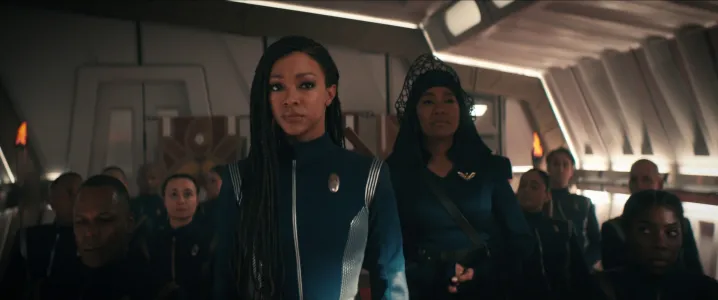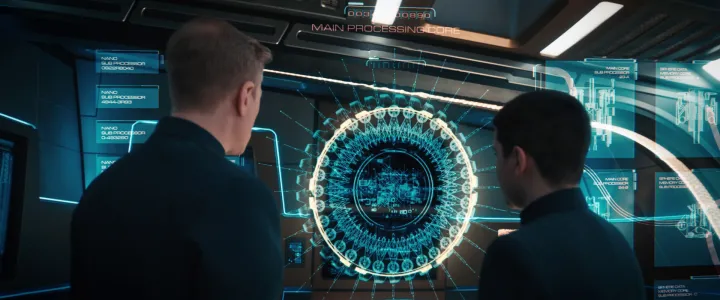
Of all the completed Star Trek series, Discovery may be the most difficult from which to pick out the 10 best episodes. That’s not because it’s the weakest series in the franchise like Enterprise is — by our reckoning, it’s actually in the low middle — but because its serialized format makes it tricky to isolate specific chapters to celebrate.
- 10. “Coming Home” (season 4, episode 13)
- 9. “Terra Firma, parts 1 and 2” (season 3, episodes 9 and 10)
- 8. “Unification III” (season 3, episode 7)
- 7. “Face the Strange” (season 5, episode 4)
- 6. “Brother” (season 2, episode 1)
- 5. “…But To Connect” (season 4, episode 7)
- 4. “Whistlespeak” (season 5, episode 6)
- 3. “Far From Home” (season 3, episode 2)
- 2. “Magic to Make the Sanest Man Go Mad” (season 1, episode 6)
- 1. “Such Sweet Sorrow, parts 1 and 2” (season 2, episodes 13 and 14)
Each season of Discovery followed Michael Burnham and the crew of the show’s eponymous starship on a lengthy adventure with cosmic stakes, but not every hour packed a memorable punch. Still, while many of the chapters tend to blur together, there are some definite standouts spread evenly throughout the show’s entire five-season run.
Ready? Let’s fly.

10. “Coming Home” (season 4, episode 13)
The finale of Discovery’s fourth season is an example of everything that’s great about the series, but also everything that’s lame about it. The Federation’s climactic confrontation with the extragalactic Species 10-C is visually splendid, emotionally intense, and ultimately a story about communication and empathy, the cornerstone of Star Trek’s ethos. Sonequa Martin-Green delivers one of the best performances in the entire franchise, as her character swallows her shock and grief at her partner’s apparent death and steadies herself for duty.
But, by the end of the episode, everything has worked out swimmingly, there are hugs and smiles and no lasting consequences. Popular progressive lawmaker Stacey Abrams makes a cameo as the President of Earth to congratulate the show’s producers Captain Burnham on her inspirational work. That’s Discovery for you — sometimes amazing, sometimes cringe, often at the same time.

9. “Terra Firma, parts 1 and 2” (season 3, episodes 9 and 10)
It’s wild to remember that, in the years before her Oscar-winning, career-redefining role in Everything Everywhere All at Once, Michelle Yeoh was playing a sassy wicked stepmother from a hell dimension on Star Trek: Discovery. As the Mirror Universe’s dethroned Emperor Philippa Georgiou, Yeoh simultaneously menaced and nurtured her daughter Michael’s goody-goody Starfleet counterpart for the better part of two seasons. Georgiou is one of the show’s most interesting characters, an apex predator removed from a predatory environment and placed in one that rewards cooperation and trust.
Her two-part send-off episode, in which she is returned to her home only to discover how much she’s changed, is twisty and campy and genuinely affecting. The rest of the regular cast gets to go wild playing their evil counterparts, and Yeoh gets to explore depths of her character that Georgiou herself would deny even exist. Discovery definitely suffers from her absence, but at least we get the spinoff movie Section 31 out of the deal.

8. “Unification III” (season 3, episode 7)
The middle of season 3 is arguably the most interesting phase in Michael Burnham’s development. After saving the entire galaxy and stranding herself in the distant future, the once stiff Michael adapts to a new life as a freewheeling adventurer just in time for Starfleet to come calling again. But in this scattered and chaotic new era, does she even still believe in the Federation? What is her purpose?
Appropriately, Michael finds her answers where her journey began — her former home planet of Vulcan, now called Ni’Var — and by seeing the results of her brother Spock’s tireless efforts to reunite the Vulcan and Romulan peoples. Unification III is essentially Burnham’s thesis defense for the Federation, and the person she most needs to convince is herself.

7. “Face the Strange” (season 5, episode 4)
No lead Star Trek character has undergone more change than Michael Burnham. From a stoic scientist raised by Vulcans to a traumatized fugitive to a rogue space adventure to a maverick Starfleet captain, Michael’s been through a lot. Season 5’s Face the Strange sends Captain Burnham bouncing uncontrollably through time, eventually pitting her face to face against her worst self.
The confrontation between season 1 Michael and season 5 Michael is both a fun little nostalgia pop and also an incredible whiplash moment that reminds the audience of just how different a show Discovery used to be. The producers may not have known that season 5 was going to be the show’s end, but they couldn’t have picked a better time to reflect on its beginning.

6. “Brother” (season 2, episode 1)
After its grim and divisive first season, Discovery took a hard turn toward the bright and colorful. With the arrival of Anson Mount as Captain Christopher Pike, Michael Burnham and the USS Discovery found a new optimism and a new purpose, as they began their pursuit of the mysterious “Red Angel.”
Though Discovery was always aiming to capture the excitement and fun of the Abrams-era Star Trek feature films, Brother is where it comes closest to the mark. If the entire series had lived up to the promise of this re-pilot, Discovery might have gone down as one of the best series in the Trek canon.

5. “…But To Connect” (season 4, episode 7)
Because of its serialized format, Discovery did not do many old-school Star Trek “message episodes,” and when it did, the writers were often sneaky about it. One of the two main storylines in …But To Connect is essentially a Human Resources mediation between Commander Paul Stamets (Anthony Rapp) and the USS Discovery’s sentient AI, Zora (voice of Annabelle Wallis). Stamets is nervous about allowing an AI to operate autonomously aboard the ship and thinks something should be done to limit her power.
But the debate being had isn’t really about artificial intelligence, it’s about whether a person with entrenched social authority (in this case, Stamets) should be permitted to limit the rights or potential of someone who they find unsettling or unfamiliar (Zora) purely based on their own discomfort. Should a trans person conceal or rein in their gender identity because it makes a cis coworker uncomfortable, or should the cis person be the one to adjust? If the answer isn’t obvious to you already, this episode will help.
4. “Whistlespeak” (season 5, episode 6)
Of Discovery’s rare attempts at classic Trek moral dilemmas, Whistlespeak is by far the most resonant and the most fun. To begin with, Burnham and Tilly (Mary Wiseman) get to indulge in a goofy away mission in which they infiltrate a pre-warp civilization and participate in an uphill marathon while essentially dying of thirst.
The dynamic between the old friends is never more lively and comedic than it is here. But, just as importantly, Whistlespeak offers two storylines that explore the contrast between religion and faith. Religion is based on rigid rules and beliefs, but faith is about what you don’t know but choose to believe. Is it really necessary to impose absolutes on something that is inherently ephemeral?
3. “Far From Home” (season 3, episode 2)
A common complaint about Discovery is its narrow focus on a single character, something that’s common enough on television but unusual for Star Trek. Discovery is about Michael Burnham first and foremost, and the rest of the crew are secondary characters. But what if you did an episode without Michael?
In Far From Home, the USS Discovery has just followed Michael into the future only to arrive without her. Beached on a strange, hostile world, Commander Saru (Doug Jones) and the rest of the crew must figure out what to make of this strange new frontier, not knowing whether they’ll ever be reunited with their friend. It’s a terrific introduction to the Wild West of the 32nd century, and an opportunity for the rest of the cast to shine.

2. “Magic to Make the Sanest Man Go Mad” (season 1, episode 6)
As a standalone episode of television, Magic to Make the Sanest Man Go Mad is squarely the best single hour in all of Discovery. It’s one of the first episodes in the series to lighten up a bit, as Harry Mudd (Rainn Wilson) traps the ship in a time loop and murders Captain Lorca (Jason Issacs) over and over and over in a variety of imaginative ways. There are cute character moments for both Burnham and Stamets, and there’s a Wyclef Jean needledrop — what else could you ask for?
The trouble is, it doesn’t really feel like any other episode of Discovery, and as evidenced by our Buffy the Vampire Slayer countdown, that counts for something. Discovery could have definitely used more goofy hour-long adventures like this one, but as it stands, it’d be more at home on Strange New Worlds than it is here.

1. “Such Sweet Sorrow, parts 1 and 2” (season 2, episodes 13 and 14)
The two-part finale of Discovery’s second season is an exhausting and exhilarating ride, as all of the show’s ongoing threads converge for a high-stakes space battle. The USS Discovery and Pike’s Enterprise finally reunite, Section 31’s evil AI makes its play for galactic conquest, and everyone from Emperor Georgiou to Klingon Chancellor L’Rell (Mary Chieffo) to that alien queen who only actually appeared on an episode of Short Treks you probably haven’t seen shows up to the party.
Most importantly, we get the reconciliation between Michael Burnham and her foster brother Spock (Ethan Peck), who set aside decades of regret and resentment to save all organic life and say their final goodbyes. Michael sets off on her new life in the distant future, Spock steps right onto a terrific new spinoff, and it’s a happy ending for everyone.





